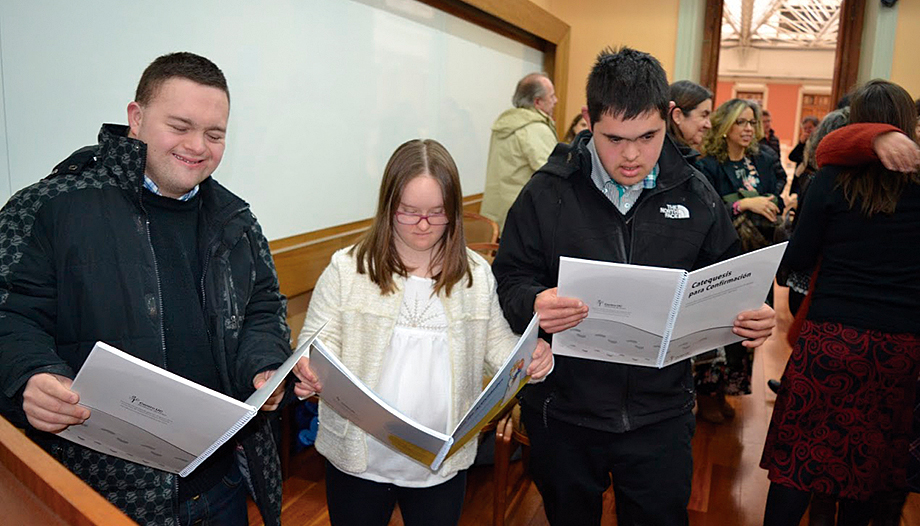A group of academics from the Pontificia Universidad Católica de Chile has developed a rare but necessary initiative: a catechetical material for people with cognitive disabilities.
The materials have been prepared by members (academics) of the university community. Even though it is not a student-led project, it can be framed in some way among the initiatives of the Catholic University in which students are directly involved, such as the "Innova Pastoral" contest for proposals for Christian innovation in different fields, collaboration with the missions, solidarity projects, etc. In this case, there are four books for First Communion and Confirmation catechesis, with a particular focus: they are designed to prepare groups involving people with cognitive disabilities.
Origin of the proposal
The material arose from the concern presented by Fabiana Sevilla, a speech therapist who has been working for years with people with Down syndrome, when she lived the experience of being a godmother at a Confirmation. As explained by Dr. Macarena Lizama, who directed the project, "Her experience as a confirmation godmother generated the concern about the existence of material aimed at people with cognitive disabilities and how was their experience in the development of their spiritual life [...]. We talked about it as a team, looked for literature and the possibility arose of competing for resources to develop educational material for catechesis, which had information and adaptations so that it could be worked on in groups where children and young people with cognitive disabilities participated".
In this way, as Marta Winter, Director of Communication at the Catholic University of Chile, explains, these materials are a way to contribute to a more just and inclusive society, and to make effective the rights of people with disabilities in relation to access to information, education and to be able to make their own decisions. One of the motivations of this project, in particular, was to achieve a material with which people with cognitive disabilities could fully enjoy and cultivate a religious and spiritual life through the knowledge of catechetical content, adapted to their needs.
Research competition
These books were developed by an interdisciplinary team of professionals with expertise in the areas of disability, theology and the design and production of educational materials.
Specifically, Dr. Macarena Lizama, pediatrician and director of the "Centro UC de Síndrome de Down", as well as Fabiana Sevilla, speech therapist, together with Andrea Lisboa, special educator, Norma Miranda, catechist, Francisca Bustamante, designer and illustrator, and Catalina Manterola, design student of our University.
The work is part of the result of the project titled "Cultivating the spiritual life of persons with cognitive disabilities: development of support materials for the promotion of spirituality and education in first communion and confirmation catechesis". It has been supported by funds from the "Research and Creation Contest of the Pastoral UC", in its 2015 version, and from the Vice-Rectory of Research of the Catholic University.
Dr. Lizama explains how well received they have been, both among the catechists and the people to whom the catechesis is directed. "The reception has been excellent."he says. "The catechists who participated in the workshop were motivated, reflecting the great need for this type of material. We had the attendance of catechists from Viña del Mar and Talca, as well as from different parts of the metropolitan region, which leaves us very motivated to be able to move forward in the search for resources to have this printed material for its distribution and massive use.". In addition, they already have experience of its use in catechesis with people with cognitive disabilities: "We conducted pretests, so as to assess whether the instructions for the activities were clear. We also discussed it with parents of people with cognitive disabilities and catechists.".
Available content
The material developed is translated into four books, which were presented to the community a few months ago. They contain materials for First Communion catechesis, one of them for the catechist and another with activities for the student, and two books for Confirmation catechesis, one a guide for the formator and the other for the confirmandi.
Since the project is not motivated by a profit motive, all these books are available to the community: parishes, catechists or people who want to use them. Therefore, they can be downloaded free of charge from the website of the "Centro UC Down Syndrome", www.centroucdown.uc.cl. However, "we hope that some publisher will be motivated to make this printed material available, so that it is accessible to those who require it."says Macarena Lizama.












